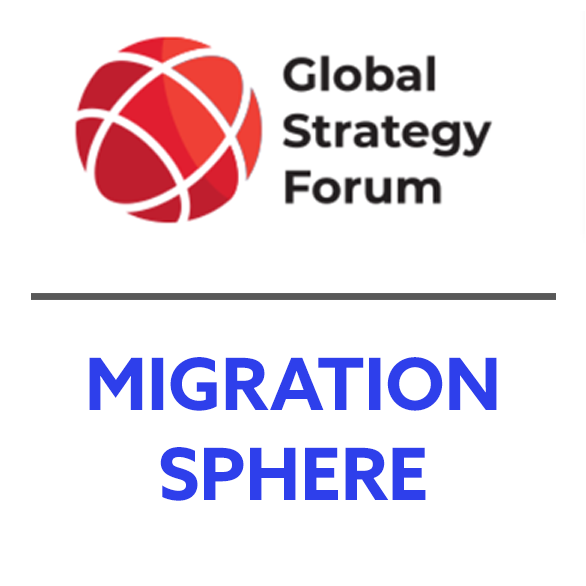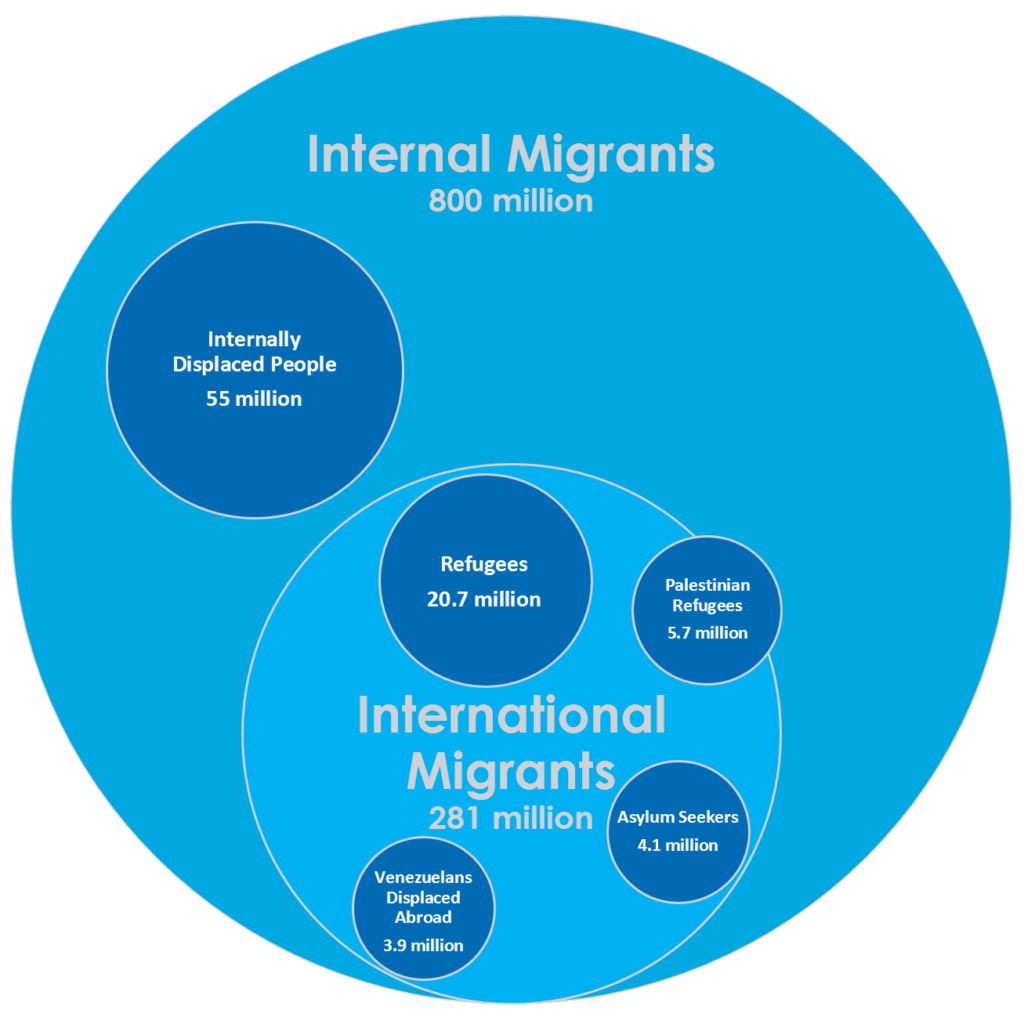 In a world that is globally connected through technology and travel, global mission is not just about sending missionaries to the ends of the earth. It is also about receiving sojourners from unreached people groups with sacrificial love, hospitality, and the gospel. Just as we are preparing missionaries to go, we should also be preparing churches to receive the sojourners, refugee, and wanderer who comes to us.”
In a world that is globally connected through technology and travel, global mission is not just about sending missionaries to the ends of the earth. It is also about receiving sojourners from unreached people groups with sacrificial love, hospitality, and the gospel. Just as we are preparing missionaries to go, we should also be preparing churches to receive the sojourners, refugee, and wanderer who comes to us.”
—Alan Cross, “Receiving Faith: The Hospitality of God Amid the Crisis of Global Migration.”
“At least 89.4 million people around the world have been forced to flee their homes. Among them are nearly 26.4 million refugees, around half of whom are under the age of 18.”
—UN Refugee Agency
With millions of migrants crossing borders and seeking refuge and asylum from persecution, violence, war, and economic hardship, what can the church do to help people receive newcomers and welcome those different from them? What can the church do to help slow migrations flows and help people relocate in healthy ways? These questions will grow more vital over the next decade and currently, national governments do not have answers. But, the transnational and global church does.
The Migration Sphere @ Global Strategy Forum seeks to provide comprehensive and multipronged solutions to challenge the narrative around migration and to offer the Gospel through propagating “Receiving Faith.” Its research and work include the following set of activities:
- Create a network of Hospitality Houses along the global migration routes.
- Develop border ministries on transit points of the global migration routes.
- Equip local churches in global cities to resettle and integrate immigrants and refugees at their destinations.
- Strengthen media and advocacy presence to offer an alternative narrative.
The State of Global Migration:
More than 1 Billion On The Move
Today, over 1 billion people are on the move.
The total estimated 281 million people living in a country other than their countries of birth in 2020 was 128 million more than in 1990, and over three times the estimated number in 1970.
Europe and Asia each hosted around 87 and 86 million international migrants, respectively – comprising 61% of the global international migrant stock. These regions were followed by North America, with almost 59 million international migrants in 2020 or 21% of the global migrant stock, Africa at 9%, Latin America and the Caribbean at 5%, and Oceania at 3%. The United States has been the top country of destination for international migration with the number of foreign-born quadrupling from 12 million in 1970 to 51 million in 2020. (International Organization for Migration (IOM), UN Migration, World Migration Report, 2022).
In addition, approximately 89.4 million people around the world have been forcibly displaced. These include 26.4 million refugees, 4.1 million asylum seekers, 3.9 displaced Venezuelans, and 55 million IDPs. The war in Ukraine has caused 7.2 million people to leave the country and another 7 million to leave their homes within the country. (UNHCR, Regional Bureau for Europe, Ukraine Situation Flash Update #29, Sept. 2022).
Finally, over 800 million internal migrants moving from rural areas to large metropolises for employment and education. (International Organization for Migration (IOM), UN Migration, World Migration Report, 2022).
Team Members
- Mark Cloherty, Strategic Coordinator, Servant Partners
- Alan Cross (Team Leader), Pastor, Petaluma Valley Baptist Church
- Dr. Linda Bergquist, Church Planting Strategist, NAMB, SBC
- Michael D. Crane, PhD, Director, Radius Global Cities Network
- Dr. Luke Glanville, PhD, Associate Professor, Australian National University
- Dr. Mark Glanville, PhD, Associate Professor, Regent College
- Clene Nyiramahoro, Nairobi, Kenya and SIL International/Wycliffe
- Minh Ha Nguyen, PhD, Director, Radius Global Cities Network
- Lorajoy Tira-Dimangondayao, Board of Directors, Lausanne Movement (Canada)
- Tricia Stringer, Director, Multiplying Hope
- Juno Wang, DIS, Ministry Associate, Community Vision International
Current Research
-
Receiving Faith: The Hospitality of God Amid the Crisis of Global Migration
Author: Alan Cross
82.5 million are forcibly displaced people worldwide, including 26 million refugees with 45.7 million people internally displaced within their countries and 4.2 million asylum seekers, according to the United Nations Refugee Agency. Mass migrations of people fleeing violence, persecution, and economic deprivation are changing both the countries they are going to and the countries they are leaving behind. If we believe that God is in control of the movements of people around the world so they will seek Him and reach out to Him and find Him, then instead of seeing mass migration as a threat, we might instead see it as a massive opportunity to reach the nations with the gospel not only by sending missionaries to the nations (ethne, or people groups), but by receiving the nations when they come to us.
-
Global Immigration, the Role of Cities, and the Strategic Positioning of the Urban Church
Author: Michael D. Crane
As the nations flow in and out of cities, it is imperative for the church to be alert to the realities of global migration (in all its forms) and imagine ways in which the church can respond. Since global migration is such a broad group, this paper will focus more heavily on refugees, asylum seekers, and economic migrants. This paper will cover the realities of migration to cities, the realities of migrants in cities, and ways for the church to respond. -
Globalization, Urbanization, Migration, and Rethinking the People Groups Concept
Author: Minh Ha T. Nguyen
This paper examines key megatrends (Globalization, Urbanization, Migration) in the world today that are changing the landscape of Christian missions. The author discusses how GUM impacts the various peoples in cities but in particular the understanding of unreached people groups. He suggests a possible solution for the Christian mission, pushing practitioners beyond the boundaries of traditional paradigms for conceptualizing ethnolinguistic people groupings in cities. He highlights that GUM processes actually present high potential for gospel spread in the city. -
The Healing Environment: A Paradigm for Flourishing
Author: Tricia Stringer
This paper will define trauma in a refugee context, then outline three core principles of creating healing communities, and finally propose how these communities could be facilitated. -
Miles, Meters, and Markers on the Refugee Highways and Corridors: A New Look at the Forcibly (and Voluntarily) Displaced Through the Lenses of Cities and Big Data
Author: Minh Ha T. Nguyen
The global refugee crisis has ignited not only public debates surrounding who should be allowed to enter but also compassion, concern, and care from the Christian church in nearly every country and city that has seen an influx of refugees and asylum seekers. Yet, the focus has often been on what happens to the migrants at the country and city of destination and not enough on the countries and cities of origin and transit. This paper therefore seeks, through a personal story, to address these complex issues first, by providing a framework for seeing and understanding the forced (and voluntary) migration from an ecological perspective. Second, it tells the story of Christian migrants seeking missionally the peace of cities where God had sent them, making disciples, and planting church not only among their people group but also all other ethnic groups in the city and beyond. Finally, it introduces methods and processes that tap into big data to identify migration highways and urban nodes in the global cities network. -
A Biblical Ethic of Kinship for People On the Move
Author: Mark Glanville
The problem today is not that Christians have failed to listen to culture, but that the church all too often echoes the values of culture, and then reads Scripture selectively in the light of these values. It is vital to listen again to Scripture, allowing the Bible as a unified story that is fulfilled in the gospel of Christ to guide our discernment. This paper is written cognizant of the pressing realities of global displacement today and also of the various political sensitivities within host nations that demand thoughtful advocacy and cultural sensitivity. -
Challenging Certain Assumptions About Political Concepts and the Responsibilities of States for Migrants and Refugees
Author: Luke Glanville
Issues surrounding refugees and asylum seekers often bring up default assumptions that do not square with the Bible. Glanville examines biblical and theological resources introduces them into the contemporary geo-political setting. The paper proposes a different approach to thinking about the global refugee crisis. -
Welcoming the Stranger
Author: Linda Bergquist
What does the Bible mean when it says to “welcome the stranger”? This paper explores how the Bible implores Christians to care for refugees and offers some Christian responses. -
Engage Global Diasporas for Glocal Missions
Author: Juno Wang
Globalization provides us with the opportunities to evangelize and disciple global diasporas who live in our community. We can share salvation openly with global diasporas, particularly with people who are from the restricted countries. As the world has become glocal, so must our missions. -
On Hospice and Home: Reflections on Next Generation Diaspora
Author: Lorajoy Tira-Dimangondayao
We are all in search of belonging and home. This is a journey and desire both physical and spiritual, on which, I believe, immigrant-background children, specifically the foreign-born who have embraced “family values,” have the potential of playing an integral role in bringing people, particularly migrants, from hospice to “home.” A vision of family provides both the centripetal and centrifugal forces to reinforce our identity and send us out—it holds us in and pushes us out. -
Trauma Healing for Refugees: Building Resilience and Restoring Dignity
Author: Clene Nyiramahoro
Trauma is part of the everyday life for refugees, with no room to breathe and recover. Trauma healing offers an invaluable help to those deeply wounded by refugee realities.
Podcast
Coming soon.
Blog
Coming soon.

